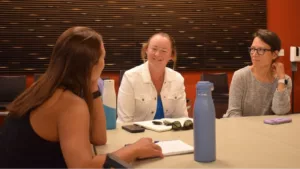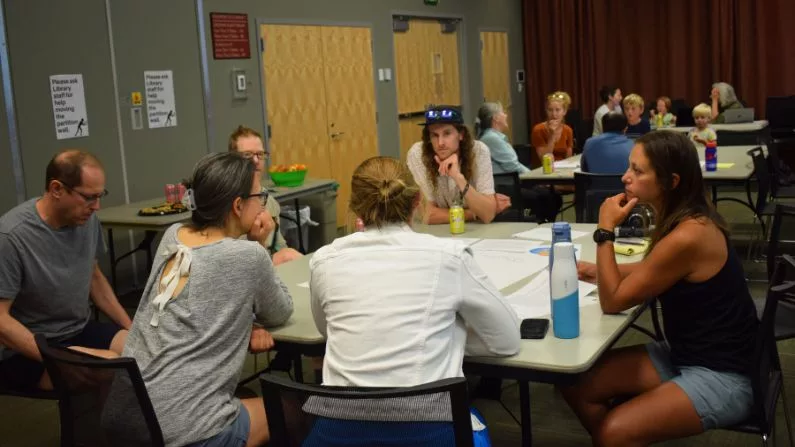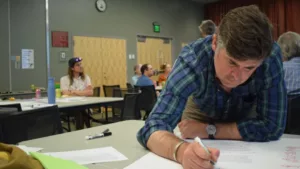Jackson residents are thinking of ways to prepare for climate change and coming up with creative proposals to minimize environmental impacts.
Cutting down traffic and xeriscaping lawns, the practice of reducing water use on landscapes, were just a few of the ideas thrown out last week during a discussion about the town’s forthcoming sustainability plan.
Jackson Ecosystem Steward Tanya Anderson opened the afternoon meeting, saying the plan will continue to commit the town to specific climate actions — like getting to net zero carbon emissions by 2030 — but will also include measures to keep vulnerable populations safe.
“If we don’t do it, no one will,” Anderson said.
In a town strapped for money, Anderson encouraged the attendees to dream big but also to think of “high impact, low cost” solutions. She added the town has the opportunity to also cover some higher costs thanks to federal dollars earmarked for climate solutions.
In front of a group of about 20 people — nonprofit leaders, town staff and other concerned citizens — Anderson foreshadowed a future in Jackson marked by extreme heat, large flooding events and higher wildfire risk.
“What we’ll really need is some aspirational action to slow those impacts that we know we’re going to see,” she said, “and be a model for other communities throughout the world who are impacted.”
Margie Lynch, who leads the Jackson Hole Climate Action Collective, applauded the town’s efforts, but said it still has a long way to go.
“There’s so much opportunity, truly, to make a difference,” Lynch said, “But there are a lot of areas where we’re not at the forefront of what’s possible.”
‘An exciting time’
Big topics of conversion included protecting the local watershed and expanding public transportation.
Meghan Quinn is the executive director of Protect Our Water Jackson Hole and sits on the START Bus board. She said at the meeting that she wants to see the Virginian RV Park turned into a model for sustainability. The town and county recently bought the land to build more than 150 affordable homes.
In an ideal world, Quinn said she would see xeriscaping, less fertilizer use, rain gutters to reuse rainwater and a START bus stop right outside.
“Almost [encourage] people who live there not to have any parking, not to have vehicles because they’re so close to town,” Quinn said.
Other community members suggested expanding START On Demand, building transit centers and — a potentially contentious idea — closing the Jackson Town Square to cars.
One resident, David Hoffman, pushed back on some of these ideas, citing worries about the town growing.
“The more you make things accessible, the more you are going to attract people to the area,” Hoffman said to other meeting attendees. “People are the pollution.”
But others championed accessibility and making the town — and its residents — more resilient to the changing climate.
Protecting vulnerable populations

Amy Macdonald chats with other residents about plans to make Jackson more resilient to climate change. (Hanna Merzbach/KHOL)
One way to do this? Provide safe community buildings people can take refuge in.
“It’s providing a safe haven for people to go when their home or their workplace is no longer a safe place to be,” said Amy Macdonald, a local engineer who prepares communities for the risks of climate change around the world.
She attended the meeting and said she’s on board with designating these specific hubs, but said she thinks the town should go further in protecting its residents and a good starting point would be conducting a climate risk assessment.
“I’ve seen the impacts that natural hazards and climate related disasters have on community and people’s lives and businesses and they are ways that we can prepare for this so they don’t have a negative impact on us,” Macdonald said.
What’s next
In an effort to prioritize equity, town staff will work with local immigrant advocacy group Voices JH to hear from non-native English speakers throughout September.
Staff will incorporate ideas from the citizen-produced climate action roadmap for the town, as well as a slew of other plans, including the Jackson Hole Travel and Tourism Board’s Sustainable Destination Management Plan.
Anderson said they’ll then present the plan to the town for approval, before any implementation.






